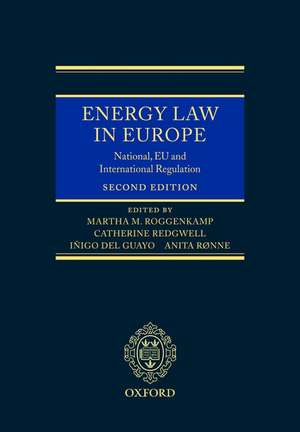Energy Law in Europe: National, EU and International Regulation
Editat de Martha Roggenkamp, Catherine Redgwell, Anita Rønne, Iñigo del Guayoen Limba Engleză Hardback – 19 dec 2007
The book also focuses on the implementation of the significant Energy Directives, and the constitutional and regulatory framework in the key energy-producing jurisdictions in the EU: Denmark, France, Germany, Italy, the Netherlands, Norway, Poland, Spain and the United Kingdom. The national coverage emphasises trans-border collaboration by examining bilateral and multilateral cooperation within the context of the European Union. There is also updated analysis of developments in these countries in every energy sector, including oil, gas, nuclear energy, and in response to the Kyoto protocol, to renewables and emissions, with the extent of coverage determined by the resource base of each country.
Preț: 2243.75 lei
Preț vechi: 2981.69 lei
-25% Nou
Puncte Express: 3366
Preț estimativ în valută:
429.35€ • 449.40$ • 357.35£
429.35€ • 449.40$ • 357.35£
Carte tipărită la comandă
Livrare economică 28 martie-08 aprilie
Preluare comenzi: 021 569.72.76
Specificații
ISBN-13: 9780199217199
ISBN-10: 019921719X
Pagini: 1488
Dimensiuni: 177 x 247 x 65 mm
Greutate: 2.2 kg
Ediția:2
Editura: Oxford University Press
Colecția OUP Oxford
Locul publicării:Oxford, United Kingdom
ISBN-10: 019921719X
Pagini: 1488
Dimensiuni: 177 x 247 x 65 mm
Greutate: 2.2 kg
Ediția:2
Editura: Oxford University Press
Colecția OUP Oxford
Locul publicării:Oxford, United Kingdom
Descriere
The energy sector in Europe has changed rapidly over the last few years under the influence of trends towards globalization, liberalization, competition, de-monopolization, and strengthening of regulation in the field. The new edition of this book builds on the success of the first in providing an updated overview of these important developments at both international and European levels, covering the most important principles of international law of relevance to theenergy sector. A chapter dedicated to comparison of legal developments across Europe addresses the increasingly important question of whether we are heading towards an international energy market. New chapters on European Union External Energy Relations and Standard Agreements in European EnergyTrade highlight growing cooperation in the energy field with major producers such as Russia, and the standards for trading energy in an integrated geographical market, including analysis of the product markets, as well as the relevant legal instruments and master agreements.The book also focuses on the implementation of the significant Energy Directives, and the constitutional and regulatory framework in the key energy-producing jurisdictions in the EU: Denmark, France, Germany, Italy, the Netherlands, Norway, Poland, Spain and the United Kingdom. The national coverage emphasises trans-border collaboration by examining bilateral and multilateral cooperation within the context of the European Union. There is also updated analysis of developments in these countriesin every energy sector, including oil, gas, nuclear energy, and in response to the Kyoto protocol, to renewables and emissions, with the extent of coverage determined by the resource base of each country.
Recenzii
This book is highly commendable. the editors present a coherent account of international, European and national energy law and politics by describing the relevant structures, institute and dynamics. It will be an important addition to law libraries as well as a necessary purchase for professionals involved in the increasingly integrated energy markets
...Offers a comprehensive review of the most important legal developments in the European energy sector. The list of authors is impressive. It includes some of the most distinguished academics and practitioners in the field. Their expertise has made this vast compilation of (inter)national energy law possible...This book provides invaluable guidance in the maze of energy law within Europe. The greatest achievement of the book is that it deals with energy in the widest possiblesense, while at the same time being in-depth. Readers are thus able to get a very thorough overview of the whole area...this book is unique in its coverage and quality. It offers in-depth and comprehensive analysis of practically all the major energy issues. It remains the leading handbook in thefield.
Review from previous edition 'This monumental compilation of European energy law draws on the collective expertise of its authors. This is a "must" for any professional or reference facility whose work involves this dynamic and fast changing field.'
'... fulfils the high expectations induced by the impressive list of authors. It is well-structured, all topics discussed are of essential importance within energy law and it is written in a clear language. The idea of involving a large number of highly reputed scholars with expertise within different areas of energy law has as a result that each chapter of the book can be read individually as legal essays which together provide a unique overview of present energy law in continentalEurope.'
A fundamental compliment to specific international, regional and national energy law treatises and handbooks, the book offers a unique overview of the various energy laws in Europe and beyond, both from the perspective of academics and practitioners
This is an excellent volume. It will appeal to both practitioners and academics and will, as the authors hope, provide invaluable material to support the teaching of energy law courses both within and beyond Europe. But it will also prove its worth for scholars and comparative law and policy makers, especially those interested in the way in which different jurisdictions handle key challenges such as deregulation, privatisation, marketing of electricity (through a pool or throughbilateral arrangements), policies to encourage the adoption of renewables, and, more generally, Kyoto implementation options
...Offers a comprehensive review of the most important legal developments in the European energy sector. The list of authors is impressive. It includes some of the most distinguished academics and practitioners in the field. Their expertise has made this vast compilation of (inter)national energy law possible...This book provides invaluable guidance in the maze of energy law within Europe. The greatest achievement of the book is that it deals with energy in the widest possiblesense, while at the same time being in-depth. Readers are thus able to get a very thorough overview of the whole area...this book is unique in its coverage and quality. It offers in-depth and comprehensive analysis of practically all the major energy issues. It remains the leading handbook in thefield.
Review from previous edition 'This monumental compilation of European energy law draws on the collective expertise of its authors. This is a "must" for any professional or reference facility whose work involves this dynamic and fast changing field.'
'... fulfils the high expectations induced by the impressive list of authors. It is well-structured, all topics discussed are of essential importance within energy law and it is written in a clear language. The idea of involving a large number of highly reputed scholars with expertise within different areas of energy law has as a result that each chapter of the book can be read individually as legal essays which together provide a unique overview of present energy law in continentalEurope.'
A fundamental compliment to specific international, regional and national energy law treatises and handbooks, the book offers a unique overview of the various energy laws in Europe and beyond, both from the perspective of academics and practitioners
This is an excellent volume. It will appeal to both practitioners and academics and will, as the authors hope, provide invaluable material to support the teaching of energy law courses both within and beyond Europe. But it will also prove its worth for scholars and comparative law and policy makers, especially those interested in the way in which different jurisdictions handle key challenges such as deregulation, privatisation, marketing of electricity (through a pool or throughbilateral arrangements), policies to encourage the adoption of renewables, and, more generally, Kyoto implementation options











